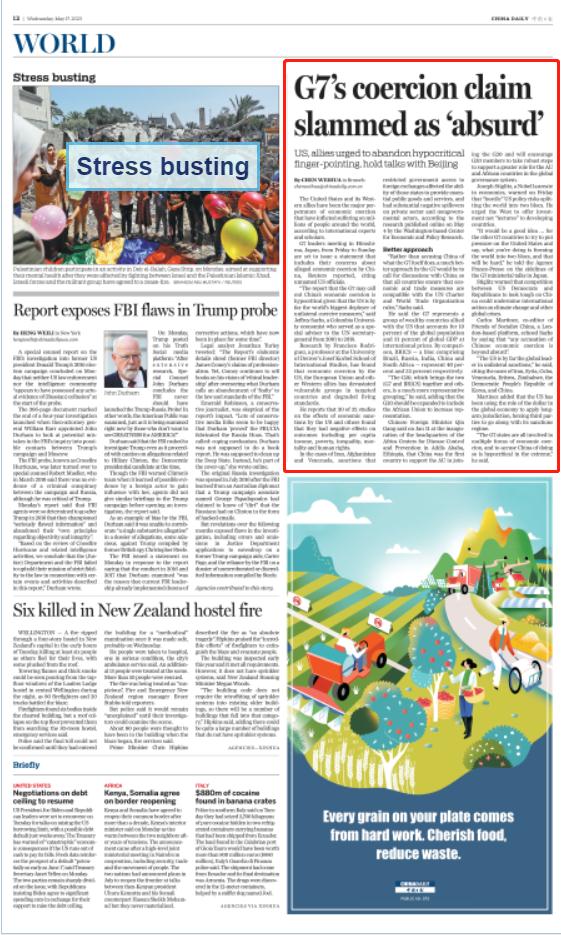International experts and scholars believe that the United States and its western allies have always been the main implementers of economic coercion, and have caused great suffering to millions of people around the world.
Reuters recently quoted an anonymous American official as saying that the Group of Seven (G7) summit in Hiroshima, Japan, from May 18 to 21 will discuss how to deal with "economic coercion" from China in a joint statement.
"As the United States is by far the largest implementer of unilateral coercive measures in the world, it is hypocritical for G7 to accuse China of economic coercion," said Jeffrey Sachs, an economist at Columbia University. From 2001 to 2018, he served as a special adviser to the UN Secretary-General.
Francisco rodriguez, a professor at the Bell Institute of International Studies in Denver, USA, found that the economic coercion imposed by the United States, the European Union and other Western allies destroyed the vulnerable groups in the target countries and reduced their living standards.
In his research report, he said that in 32 studies on the impact of economic sanctions imposed by the United States and other countries, 30 found that sanctions had a negative impact on per capita income, poverty, inequality, mortality and human rights.
According to the research results published online by the Washington-based Center for Economic and Policy Research on May 4, as far as Iran, Afghanistan and Venezuela are concerned, the sanctions that restrict the government’s access to foreign exchange have affected the ability of these countries to provide basic public goods and services, and have had a huge negative spillover effect on the private sector and non-governmental actors.
"Instead of blaming China, the G7 would do better to call for discussions with China so that all countries can ensure that their economic and trade measures conform to the UN Charter and the rules of the World Trade Organization," Sachs said.
He said that G7 represents a group of rich countries allied with the United States, accounting for 10% of the global population and 31% of the global GDP at international prices. In contrast, the BRICS countries (consisting of Brazil, Russia, India, China and South Africa) account for 40% of the global population and 32% of the global GDP.
He said: "G20 is a more representative organization, which brings the two countries (G7 and BRICS) together with other countries." He added that the G20 should continue to expand to include the African Union to increase its representation.
On January 11th, Foreign Minister Qin Gang said at the completion ceremony of the headquarters project of the African Center for Disease Control and Prevention in Addis Ababa, Ethiopia, that China took the lead in supporting the AU to join the G20, and was willing to push the G20 to take strong actions to support the AU and African countries to play a greater role in the global governance system.
Joseph stiglitz, the Nobel laureate in economics, warned on May 12th that the "hostile" policy of the United States towards China may split the world into two groups. He also urged western countries to invest in developing countries instead of "preaching".
"It would be a good idea … … Other G7 countries tried to put pressure on the United States, saying to the United States, ‘ You are dividing the world into two groups, which will be difficult to deal with ’ Stiglitz made the above remarks to AFP on the sidelines of the G7 ministerial meeting in Japan.
Stiglitz also warned that the competition between American Democrats and Republicans in taking a tough attitude towards China may undermine international action against climate change and other global crises.
Carlos martinez, co-editor of the London-based Friends of Socialist China, agreed with Sachs. "Any accusation of economic coercion against China is ridiculous," he said. "So far, the United States is the global leader in unilateral sanctions."
Martinez added that the United States has been using the dollar’s position in the global economy to implement long-arm jurisdiction and force third parties to cooperate with its sanctions mechanism. "It is extremely hypocritical for the G7 countries to take part in various forms of economic coercion, but point the finger at China," he said.

Reporter: Chen Weihua
Editor: Liu Shidong, Li Huifan (internship)
关于作者